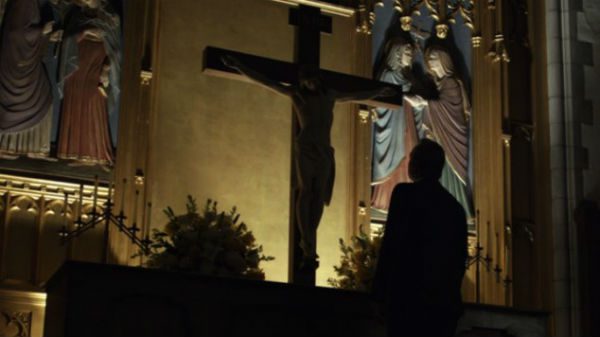Recently, I was talking to Father David Guffey of Family Theater Productions in Hollywood, an apostolate that also produces scripted entertainment, under the auspices of Holy Cross Family Ministries. More from him in a future post, but we were discussing the problem of producing compelling entertainment with Catholic values.
He said:
We have to make sure that we can’t have something that’s so off the mark that it’s offensive, offensive in a scandalous way, but we also have to show the dark side of life. We have to show that the wages of sin is that. To show the wages of sin, you have to show sin.
In episode four of the most recent, third season of of Netflix’s political drama “House of Cards,” President Frank Underwood (Kevin Spacey) engaged in a theological discussion with a bishop (not 100 percent certain if he was Catholic or Anglican), after which Underwood — alone in the sanctuary of the church — spat on a crucifix, which then rocked violently, fell from its perch and crashed to the floor.
(If you’re interested, I’ve posted an entire transcript of the scene at the bottom of this post.)
This tremendously upset Newsbusters executive editor Tim Graham, who wrote a scathing post called “Shame on Netflix,”  decrying what he saw as blasphemy.
decrying what he saw as blasphemy.
Frank Underwood has become the Walter White of politics. The journey to full-blown evil was shorter for Underwood, but this show is revered just as much as Breaking Bad. Is the crucifix-spitting taking this theme too far? It absolutely is. But this scene is shocking, and then on reflection, it’s not.
Walter White was the lead character in “Breaking Bad,” a cancer-stricken science teacher turned meth cooker. I watch “House of Cards,” but I skipped that one.
Anyway, Hollywood screenwriter Brian Davidson (“CSI: Miami,” “The Seventh Portal”) wrote to Newsbusters to protest — especially in the wake of comments that he said accused him of being a “corrupt ideology peddler” and an “atheist anti-God hater.”
To his credit, Graham not only responded to the complaint, but allowed Davidson — who explains that he is a (italics his) Church-belonging, Bible-obeying, saved by His blood, Christ-follower sent from a Fort Worth church with my wife as missionaries to Hollywood — to post his rebuttal.
Davidson then explains that he’s not alone in Hollywood — which I can say, from personal experience, is true, but we’re still a distinct minority in positions of power — and he’s grateful to “House of Cards” for doing what it did. He explains why, and then offers a primer to conservatives and Christians on how to deal with the media (echoing some of what I said in the opening post for this blog).
Click here to read Davidson’s whole, excellent piece, but the first two of his four points (and the last one’s a kicker) explaining his reasoning in praising “House of Cards”:
Frank Underwood is a villain… Of Shakespearean magnitude! Nor does he want you to approve Frank’s actions — especially here. This scene echoes another from last season, where Frank begins to pray to God but stops, “No, I pray to myself.” Making himself God’s equal. He says he doesn’t believe, but yet he’s threatened by God’s power.
Frank cannot erase his sin(s)… When Frank tries to wipe away his spit, the statue falls before he even touches it. A falling crucifix traditionally means God’s blessing is gone…so we can’t help but see this as God’s answer: “I will not forgive your crimes or (allow you to) blot out your sins from my sight” (Jeremiah 18:23).
And he goes on to say:
The only shocking thing about this scene, is the writer…Has a religious leader correctly quote New Testament scripture in a positive way; gives the Christian big balls (he rides a motorcycle) to boldly speak Biblical wisdom to a dangerous President; bends over backwards to portray God is not silent, loudly answering the wicked; And, for bonus points, he made the bad guy a Democrat.
It’s useful to remember also that no unbeliever without an audience watching would bother to spit in the face of an inanimate object — and then try to wipe it away. Frank Underwood wasn’t spitting on a thing, he was spitting on a person.
Frank Underwood may be a evil and an apostate, but he’s no atheist.
And for those who wonder what the fuss is all about, here’s the end of the scene between Underwood and Bishop Charles Eddis (John Doman):
And now the whole scene (all transcription errors totally my fault):
F: Still riding the Bonneville?
B: Sold the ’67 for a PipeBurn.
F: You should take me for a spin sometime.
B: I don’t think so. They’re a death wish.
F: At least you know you have a place in heaven.
B: What’s on your mind, Mr. President?
F: The burial the other day, you talked about Abraham, Isaac, God giving up his only son.
B: Between you and me, that’s the same sermon I always use at Arlington. You put enough soldiers in the ground, you get tired of writing new ones.
F: It was the first time I heard it.
B: Won’t be the last.
F: I want to understand what justice is.
B: That’s a big one.
F: I know.
B: There’s our justice, the kind men create. We base it on things like the Ten Commandments, but those can be read a million different ways.
F: “Thou shalt not kill” seems pretty clear.
B: Who’s to say? If we didn’t kill, others would kill instead of us. There’s a lot of killing in the Bible. King David was a warrior.
F: How do you reconcile that with the laws that God gave Moses?
B: Even those laws require interpretation. There are two laws we have to remember above all else. He (pointing at the crucifix on the altar) tells us to love God and to love each other.
F: You can’t love the people you kill.
B: You sure as hell can, and you have to love the people who are trying to kill you.
(Francis walks closer to the altar)
B: Jesus loved the Romans. “Father, forgive them,” he said, “for they know not what they do.”
F (standing near the crucifix): Why didn’t He fight? Why did He allow Himself to be sacrificed?
B: I ask myself that question a lot.
F: I understand the Old Testament God, whose power is absolute, who rules through fear, but Him (points to Christ) …
B: There’s no such thing as absolute power for us, except on the receiving end. Using fear will get you nowhere. It’s not your job to determine what’s just. It’s not your place to choose the version of God you like best. It’s not your duty to serve your country alone, and it’d better not be your goal to simply serve yourself. You serve the Lord, and through him, you serve others.
Two rules: love God, love each other. Period. You aren’t chosen, Mr. President (points to Christ), only He was.
F: May I have a few moments, for myself, to pray?
B: It’s all yours.
(The bishop leaves; Francis walks up to the crucifix, camera angle shoots past the back of Christ’s head and down on Francis’ upturned face)
F: Love, that’s what You’re selling? Well, I don’t buy it.
He spits on the face of Christ, then thinks the better of it and pulls out a handkerchief to wipe away the visible spittle. But when he touches the figure, it shakes violently, nearly leaping from the cross and smashing to the ground in pieces.
The Secret Service agent runs up, “Is everything all right, sir?”
F: I was praying, and it just fell.
He walks off, but on the way, picks up a piece of the broken plaster corpus.
F: Please have someone clean this up.
SS Agent: Yes, sir.
F: Well, I’ve got God’s ear now (the camera shows he’s holding a piece with the figure’s ear).
Images: YouTube (screenshot); Netflix














